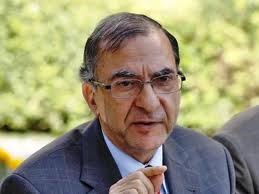Governor McAuliffe Kicks Off Pakistan Independence Day Festival in Washington, DC.
September 1, 2015. We are proud of the achievements of the Pakistani Americans not only in Virginia but also in the United States. Pakistani culture is a beautiful culture, said Hon. Terri McAuliffe, Governor of the State of Virginia who was the Chief Guest to kick off Pakistani Independence day Festival at Fairfax, Virginia which was attended by several thousand people.
“The celebration of the 69th anniversary of Pakistan independence is truly joyous and auspicious occasion. We should be proud of the prestige of our native land and reaffirm our conviction to make it stronger, democratic and more prosperous. We celebrated the first Pakistan Independence Day at Lincoln Memorial, Washington DC on August 14, 1987. There was no place more appropriate to hold independence day celebrations than the memorial of Abraham Lincoln, emancipator and quintessential American hero,” said Zahid Hameedi, the Chief Organizer of the festival who is also a veteran journalist and prominent leader of the Pakistani American community.
Mr. Hameedi added that the Pakistani people are honored to hold their Independence Day celebrations in the country, where constitutional democracy was born over two centuries ago. America in 1776 held high its arms and lit the lamp of republican democracy. That beam of light has brightened the entire world with its promise of hope and human dignity. We are a peace and freedom-loving nation. We stand shoulder to shoulder with the American people in a fraternity of freedom lovers, in pursuit of peace and love all over the world.
Dr. Ghulam Nabi Fai, Secretary General, World Kashmir Awareness while addressing the mammoth gathering emphasized that “We must build support for the active involvement of the United States to help resolve the Kashmir dispute in accordance with the aspiration of the people. There is no way that the world powers can deal with the tensions between India and Pakistan without simultaneously addressing the underlying cause of these tensions – that is Kashmir. With India and Pakistan both being nuclear-weapon states directly confronting each other, this dispute is potentially the most dangerous in the world. It should, therefore, be a major interest of the U.S. to prevent this dispute from exploding into a conflict which can be catastrophic for a large proportion of the human race.”
Dr. Fai appealed to the friends of Kashmir to mount an awareness campaign in support of self-determination in Kashmir and remind the Obama Administration the implications for its strategy of conflict in a region of South Asia and of the delicate relationship that need to be safeguarded from violent disruption. We need to enlist the support of the United States to persuade India and Pakistan to include Kashmiri leadership in any future dialogue that will lead to the lasting and durable settlement of the Kashmir dispute.
Addressing this animated audience, Mowahid Hussain Shah — attorney-at-law, author, and former Punjab Cabinet Minister – pointed out that the Islamic connection with the United States is deep-rooted. He emphasized that, as early as 1765, Thomas Jefferson possessed a copy of the Holy Quran. And 250 years later, Congressman Keith Ellison from Minnesota – the first Muslim elected to the Congress – took an oath of office on this very copy of the Holy Quran, which Thomas Jefferson kept at his home in Monticello, Virginia. Mowahid stated that Pakistan is essentially a gift of the extraordinary leadership of the Quaid-e-Azam, who combined the virtues of Thomas Jefferson and Abraham Lincoln.
Mowahid particularly urged the Pakistani American youth to step up their role and bring honor to their Pakistani heritage by assuming their rightful positions in the policymaking professions of the United States. Mowahid maintained that, to gain respect in mainstream America, you have got to have self-respect. In this connection, he concluded by citing the splendid example of boxing champion Muhammad Ali who is now acclaimed as the sporting icon of the 20th century.

 This flood was the first in history, in the living memory of Kashmir. More than 450 people are dead, and more than $1bn in destruction has been estimated. The actual magnitude of the total destruction, the number of dead and the people who are missing may not be known for some time. Kashmir Valley was cut off from the rest of the world for days. Thousands of villages have been submerged, including the capitol city of Srinagar. Hundreds of thousands of people particularly in the rural areas still remain trapped without any outside help or rescue and relief. There has been a total breakdown in communication with no telephone contact of the people with their loved ones Boats were not available. People had to stand on their rooftops waiting for someone to rescue them.
This flood was the first in history, in the living memory of Kashmir. More than 450 people are dead, and more than $1bn in destruction has been estimated. The actual magnitude of the total destruction, the number of dead and the people who are missing may not be known for some time. Kashmir Valley was cut off from the rest of the world for days. Thousands of villages have been submerged, including the capitol city of Srinagar. Hundreds of thousands of people particularly in the rural areas still remain trapped without any outside help or rescue and relief. There has been a total breakdown in communication with no telephone contact of the people with their loved ones Boats were not available. People had to stand on their rooftops waiting for someone to rescue them.